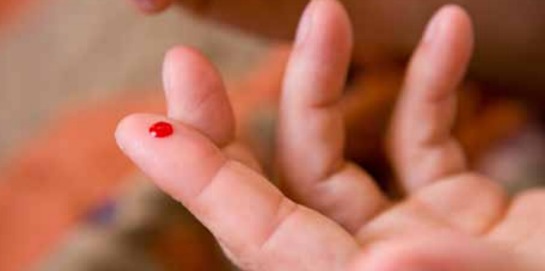ADAMS Helps with Diabetes Self-Management

She never thought she would think consciously about food. Farzana Sikandar of Sterling, VA knows the meaning of beauty, she is an esthetician but reading labels and counting calories were not a part of her beauty regime. Last year she was diagnosed with diabetes. Her son saw a flyer at the masjid for the fall/winter session of the Diabetes Self-Management Program (DSMP) Workshop Series taught by Zubair Saeed, M.D., the Community Health Specialist at Fairfax County Health Department. He was the former Director of Health Programs at ADAMS.
Sikandar signed up and started attending the weekly sessions at ADAMS. At the workshop, she made friends in a ‘relaxing atmosphere where everyone was comfortable sharing their problems,” says the bubbly Sikandar. They motivated each other to go to the gym. “I changed the way I cook specially for myself,” she adds.
Seema Khan is a school teacher from Herndon, VA, she developed gestational diabetes in her third pregnancy. “I never took it seriously and now it is back,” she shares. Listening to the after Juma announcements, she heard about the workshop and decided to take her health seriously. She brainstorms with other attendees on how to fit a walk into a busy day. A recent death in the family derailed her schedule and workouts but she hopes to get back on track. She has three sons in their 20s but they don't make good workout buddies. “I got a sister’s number tonight,” says Khan, as she makes plans to exercise with her.
As a discussion on food intake concludes with call to prayer, attendees encourage each other to track their blood sugar numbers; others ask Maureen Harris, the registered dietitian who co-teaches the session, to share a recipe of homemade bread which one attendee had plugged into myfitnesspal.com, giving her an exact calorie count.
“Does insulin make you gain weight?” inquires a woman with a Persian accent. Another brings in a glossy book and quietly asks Harris if she should follow the fad diet it prescrbes. “Ask your doctor before starting [any] diet,” advises Harris.
The workshop teaches self care, promotes confidence, stress management and self love. “Be your own advocate,” says Harris and change your doctor if they do not listen. “We encourage [the attendees] to continue to meet even after the session is over,”says Dr Saeed. Similar sessions as well as chronic disease management workshops were also offered at Mustafa Center and Islamic Center of North Virginia Trust.
Dr Saeed is proud of this batch. They come every week and on time, and genuinely seem to enjoy the class and each other’s company. “ADAMS experience has been solid,” he says. He needs more co-leaders, especially Muslims. Currently he teaches the classes with his non-Muslim colleague. “I need passionate people who want to help others. You don't need a medical health background, just a willingness to commit to a 4 hour training and 6 week commitment.”
The curriculum is prepared by Stanford University and they are very particular that the exact program is followed. An observer from the state will come to monitor a session or two to make sure that the county does not deviate from the program. Sometimes attendees do ask Dr Saeed Islamic solutions to their health problems and he gives them the Prophetic example: eat less. The Prophet Muhammad would eat one meal a day, eat two meals a day and don’t eat when you are not hungry.
Farrukh Husain holds out his prescriptions for the nine medications he takes every single day. Looking at numbers, Dr Saeed thinks he should go back to his doctor as he should be able to cut down on the medication. Husain has lost weight, he walks a mile 3-4 times a week on the treadmill. Spicy food and rice is also cut from his plate. He works in Alexandria and makes to the class a little late but it is worth the drive. “More people should come and benefit from this program,” assesses the Sterling based accountant.
“Another thing we have been doing here at the Health Department for a number of years is we help the uninsured find medical care. I frequently help uninsured patients get connected.” says Dr Saeed. He appreciates the time that he given at the pulpit of area Islamic Centers. Some have not let him speak or set up workshops but others have been welcoming. He keeps campaigning on.
Resources in Fairfax County
Fairfax County’s Community Health Care Network (CHCN) is a place where uninsured people can find free or low cost primary care. In addition to enrolling eligible patients into this network, the medical social workers at each of these three clinics help patients to become enrolled in other medical care programs such as Medicaid, Medicare, the Affordable Care Act (Obamacare), Kaiser Bridge, and other programs a patient may be eligible for. Set up an appointment with a medical social worker to find a medical home that is best for you. For more information about CHCN please see this link …
http://www.fairfaxcounty.gov/hd/pcs/hdchcn.htm
The Fairfax County Health Department offers a variety of free services (including pediatric dental care) for eligible patients, for more information please see this link…
http://www.fairfaxcounty.gov/hd/hdclinicsite.htm
Here is a link to Northern Virginia Health Services Coalition: http://www.novaclinics.org/home
Here is a link to a free clinic called HealthWorks for Northern Virginia … http://hwnova.org/
Here is a link to the HOPE free clinic in Fairfax … https://www.missionlifecenter.org/hopeclinic
Here is a link to the All Dulles Area Muslim Society (ADAMS) free clinic called the ADAMS Compassionate Healthcare Network (ACHN) …
http://achnclinic.com/









Comments powered by CComment